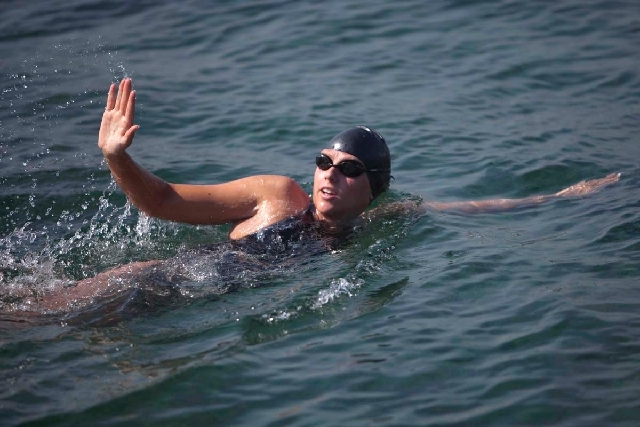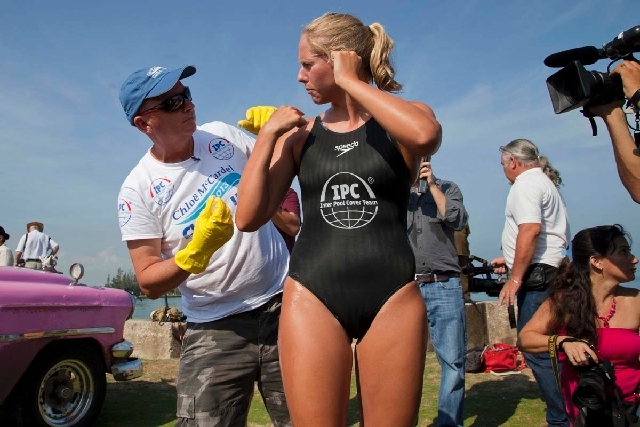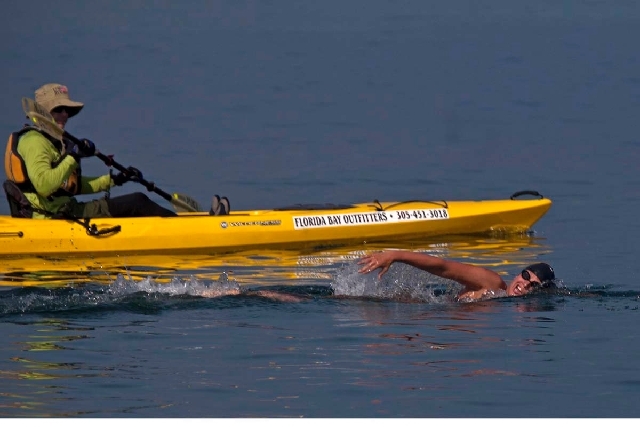Jellyfish stings end Australian’s Cuba-to-Florida swim attempt
HAVANA — Australian endurance swimmer Chloe McCardel ended her attempt to swim from Cuba to Florida after 11 hours in the water when she was stung by a jellyfish Wednesday night.
It was the fifth failure involving three women swimmers who have tried to make the marathon swim since 2011. Jellyfish stings and strong currents have been the main impediments.
Her support team released a statement saying that McCardel stopped her effort to become the first person to swim across the Straits of Florida nonstop without a shark cage “due to a severe debilitating jellyfish sting.”
It said she had been taken on to one of her support vessels and was sailing to Key West. She would need 24 hours to recuperate, it said.
Bob Olin, skipper of the primary support boat, the Sunluver, said McCardel had suffered multiple stings.
“She got nailed all over her body — back, legs and arms. Nailed multiple times, all at the same time,” he told The Associated Press by satellite phone.
He said the team tried to treat her wounds while she remained in the water, but had to take her on board a boat because she was suffering “excruciating pain.”
The swimmer had not said much since leaving the water, Olin said.
Diana Nyad, an endurance athlete who failed three times to make the same crossing and has said she’d like to take another shot this summer, tweeted her commiseration.
“It’s a tough night for Chloe McCardel, a superior swimmer and an exemplary spirit,” Nyad wrote.
McCardel, a 28-year-old from Melbourne, had hoped to complete the swim in about 60 hours.
Before starting out from Cuba in the morning, a smiling, upbeat McCardel had arrived in a pink 1950s Chevy convertible at a rocky jetty in western Havana
“As confident as I can be. I think it’s all going to work out well,” she said of her chances. “It’ll be tough, though.”
McCardel then jumped feet first into the water at 10 a.m. sharp.
Her goal, the Florida Keys, lay a little more than 100 miles (160 kilometers) to the northeast of Havana.
The sea off Havana was flat and glassy, precisely the ideal conditions that McCardel’s science team had forecast.
The strait has been busy the last three summers, with fellow marathon swimmers Nyad and Penny Palfrey making four failed attempts at the crossing between them since 2011.
Australian Susie Maroney successfully made the swim in 1997, although she did it with the benefit of a shark cage.
“It is the hardest swim in the world today,” McCardel had said Tuesday at a news conference. “No one has been able to achieve this. It’s possibly harder than winning the World Cup or getting a gold medal.”
The challenge also outstripped by far, at least in terms of distance, anything she had done before. McCardel, who has twice made a double crossing of the English Channel, said the most time she had spent in the water continuously was 25 hours.
She swam under English Channel Marathon rules, which meant she could not touch her support boat or hold on to anything. Nor was she allowed to wear a full-body wetsuit, which would have helped protect against exposure and jellyfish stings.
McCardel and her team had spent nine and a half months planning the trip and studying others’ attempts to try to figure out why those athletes were unable to complete the swim.
The team picked June for the attempt in a bit of a trade-off: While seas are warmer later in the summer, this month typically sees lower concentrations of box jellyfish, whose dangerous stings have scuttled past attempts.
“The Gulf Stream ... it’s like a wild animal,” McCardel said.
It was an unlikely dream for a woman who didn’t even learn to swim until she was 10 years old.
McCardel, who makes a living doing first-aid training, and her husband took out a second mortgage on their home to finance the $150,000 in costs associated with the swim.
They had made about half of it back through sponsorships, and leaned heavily on volunteers and donations.
At the marina Wednesday morning, McCardel was just about to hop into the water when suddenly she turned around and called out for her husband, Paul.
“I love you,” she said, giving him a quick kiss. “Thank you. Bye!”
———
Peter Orsi on Twitter: www.twitter.com/Peter—Orsi

























